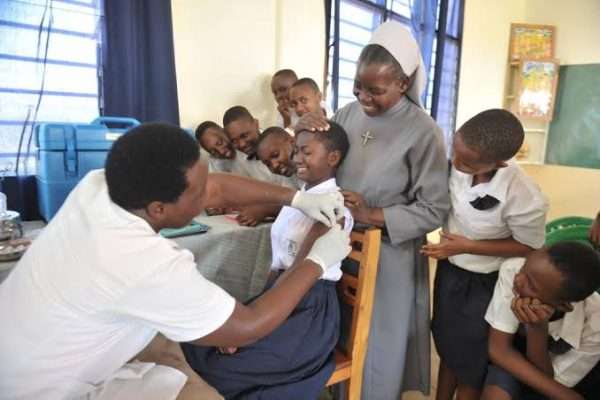
The Rwanda Biomedical Centre (RBC) says it has fully vaccinated 1.5 million girls against Human Papillomavirus (HPV) through its National vaccination programme.
The Immunisation Manager, RBC, Hassan Sibomana, said with cervical cancer being the second leading cancer among women in Rwanda, the government embarked on the introduction of the HPV vaccines for girls in 2011 to reduce the mortality and morbidity burden of cervical cancer.
Sibomana, who was fielding questions from journalists during a virtual media briefing on HPV vaccination progress in Sub-Saharan African, further disclosed that 5,563 women got treatment for pre-cancerous lesions and 1,230 received diagnoses for cervical cancer in Rwanda in 2021.
He said the government of Rwanda rolled out HPV vaccinations to young girls in 2011, and more than 1.15 million girls in the country received a first dose of HPV vaccine between 2011 to 2018.
Meanwhile, a Professor of Public Health, from the University of KwaZulu-Natal, South Africa, Mosa Moshabela, revealed from field experience barriers to successful implementation of HPV vaccination programmes in sub-Saharan Africa, to include low trust in vaccines, misinformation, vaccine stigma, religious beliefs, vaccine refusal, missed vaccine opportunities, parents’ limited knowledge about threat of vaccine-preventable illness, availability of effective vaccines, fears about vaccine safety, patriarchal systems or lack of transportation.
Prof. Moshabela, said vaccine supply constraints, such as limited staff resources, electronic health records, state immunisation registries, cultural/language barriers, competing priorities, levels of funding, staff buy-in, training needs, and health literacy, need to be addressed by African countries in order to overcome vaccine hesitancy as it is experienced in some regions.
According to Sibomana “Cervical cancer screening for women were also conducted at health centres and the outcome increased annually, with a total 267,825 screened. In 2018, 11,108 got screened; 2019, 14,410 women; 2020, saw 27,864 screened; 2021, had 77,424 women; 2022, witnessed the highest turnout of women 108,842; and 2023, has 28,177”.
The Rwandan vaccination manager identified the use of data to demonstrate the importance of new vaccine introduction, and the high incidence of cervical cancer in East Africa in 2011, as one of the major tools that enhanced easy uptake of the vaccines among parents and other stakeholders.
Additionally, he mentioned use of data from Rwandan Cancer Registry and global evidence of vaccine efficacy and cost-effectiveness, served as decision-making enablers to the people.
He also commended the commitment of GAVI to support HPV vaccine beyond the first three years, as advocacy for availability of vaccine, vaccine devices and social mobilisation was done by MSD.
Other approaches adopted by the Rwandan government, he disclosed were school-based approach to deliver HPV vaccine, while the first 3 years adopted (2011-2013) vaccination targeting grades, they advanced from 2014 to single age group targeting of 12 –years-old girls only.










